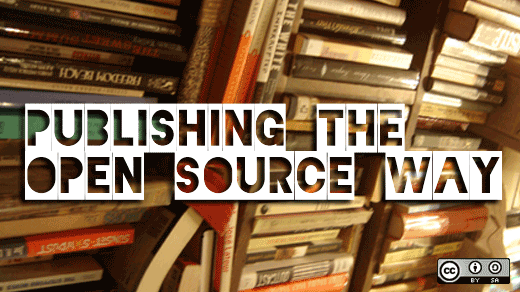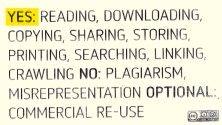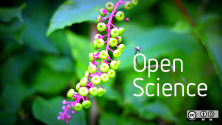As a child I remember being fascinated by science, and developed an overwhelming urge to learn how everything worked. I loved science fiction, seeing authors explore the very edges of possible futures, extrapolating out the possibly feasible to its very limits. As I grew older and began a degree in Physics, I became even more certain I wanted to be a scientist and had a vision of what real science was all about. I remember the first few months of my PhD work being quite disappointing, learning that papers often lacked the necessary details to reproduce key reactions, or that I didn’t have access to certain papers due to their age or the journal they had been published in.
I worked hard on my research, wanting to have an impact and learn more about something I found interesting and that I hoped would one day result in new discoveries. Once I had enough results to publish, I began working on my very first paper, one that my supervisors encouraged me to publish in an appropriate journal for our research. I had never really considered the low level details of publication, but was shocked at how one-sided everything seemed to be. I worked for months on end in the lab, learning everything I could about my field, with my time and materials funded by one of the UK’s research councils using public funds. Once the article was ready to submit I jumped through many hoops, including signing away all of our rights to the submitted work, corrected any issues the reviewers pointed out, and finally got it published. The company we published with then sold it back to us, with many of my friends and family unable to access it despite no compensation being given to me or my university.
I remember feeling very disillusioned with the system, but continued to publish when I was asked to as I knew that this was an essential step if I was to continue a career in academia. My rate of publication was relatively low, working at an interface between physics and chemistry on various nanomaterials and their novel properties. I later began a postdoctoral fellowship with more of a focus on computational models, in addition to experimental work I had done in the past. This was fun, but I realized that I was also moving into an area where publication seemed more restrictive than ever with things like preprints explicitly disallowed for many of the journals we considered viable avenues to publish our research in.
Once I left academia I realized just how different the world was—the research I had conducted in the past was now inaccessible to me, stuck behind academic paywalls. In the past when I found a paper and the abstract looked interesting, I could simply click on the full text link and get the paper. If it turned out it was not very relevant (happened most of the time), I could close the article and keep searching. Now that I had lost my academic IP address, with all of the journals I had been accustomed to having "free access" to in an affluent Western university, I was restricted to gleaning what I could from abstracts and article graphics. I had become what Peter Murray-Rust termed "scholarly poor," a highly qualified scientist essentially shut out of the scientific process due to the academic paywalls in place. I was no longer able to follow developments in my field, and should I choose to publish more articles about my research after leaving academia, I would also be unable to read it once published.
We recently published a paper on Avogadro, a cross-platform, open-source molecular editor and analysis package. The paper summarized the results of approximately five years of development effort, spread between a distributed team with some applied hours and a lot of our spare time. We discussed several possible venues for this work, but one thing I was certain of was that I wanted to see it published in an open access journal and one that uses a liberal CC-BY license so that others can freely redistribute the article. I had co-authored a couple of papers with collaborators the year before in the Journal of Cheminformatics, and after some discussion, we decided that this would also be a great place for the Avogadro paper. The work we were publishing was somewhat different to the typical academic article, but, in my honest opinion, our core goals remained the same: to summarize what we had done, what we felt was novel, and to provide a reference that could be cited and built upon.
One of the more difficult aspects for me as someone who works for a small business is how we fund the author publication fee, along with justifying the expense to our management. In this particular instance we were very lucky to be supported by an ongoing collaboration, but in the future I would like to have a strategy to allow us to publish open access articles. We must be able to show that the open access publisher is legitimate, not a vanity publication or other shady publisher looking to extract money from us. It is clear that more funding agencies are making this easier, but it can be difficult for researchers in less conventional positions to find the necessary publication fees even when they wish to publish using open access journals.
Ultimately the publication of the Avogadro paper was a rewarding and positive experience, and I am very pleased that the paper is available to all in perpetuity. I know that I am free to use any of the images or text from the article in other places due to the liberal licensing and our retention of copyright. We are still waiting on the final PDFs/HTML for the article, but this and other inefficiencies are comparable to closed access journals. The idealist in me thinks that no matter what it takes, we must work towards establishing a research community where publication is not just about impact factor, but meaningfully communicating the outputs of our work with the wider community—for both scientists and members of the general public. I think one of the reasons science has a hard time in the mainstream media is because many of us were taught to write largely inaccessible text that is unnecessarily long.
We need to work harder to engage people in the work we are doing, especially those of us who are funded by the various research agencies and trusts from around the world. We need to take a stand against publishers demanding too many rights over our work, which we give to them freely thanks to the funding we receive. I will never willingly publish as a first author in a closed access article again, signing over all of my rights to the publisher with no compensation. If my collaborators are determined to publish in such journals, I will comply; but I will encourage them to consider open alternatives. I want my son to grow up in a world where scientists care about making their work accessible, where they must be accountable, and for them to publish their work with enough information to reproduce it. If the research is not reproducible then what is the point in publishing it at all? If it is merely to earn points towards tenure/future funding decisions, it indicates a deeper problem with the way publications are currently being assessed.
Originally posted on Nature.com's SpotOn blog. Reposted with permission.






4 Comments